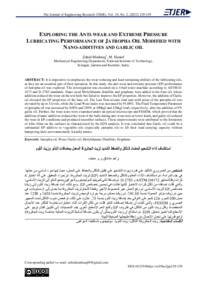وثيقة
Exploring the anti-wear and extreme pressure lubricating performance of jatropha oil modified with nano-additives and garlic oil.
المعرف
DOI:10.53540/tjer.vol19iss2pp129-139
المصدر
Journal of Engineering Research, v. 19, no. 2, p. 129-139.
المساهمون
Hanief, M., مؤلف
عناوين أخرى
استكشاف أداء التشحيم المضاد للتآكل والضغط الشديد لزيت الجاتروفا المعدل بمضافات النانو وزيت الثوم.
الدولة
Oman.
مكان النشر
Muscat
الناشر
College of Engineering, Sultan Qaboos University.
ميلادي
2022
اللغة
الأنجليزية
الملخص الإنجليزي
It is imperative to emphasize the wear-reducing and load-sustaining abilities of the lubricating oils, as they are an essential part of their operation. In this study, the anti-wear and extreme pressure (EP) performance of Jatropha oil was explored. The investigation was executed on a 4-ball tester machine according to ASTM-D4172 and D-2783 standards. Nano-sized Molybdenum disulfide and graphene were added to the base oil, whose addition reduced the wear on the test balls but failed to improve the EP properties. However, the addition of Garlic oil elevated the EP properties of the base oil. The Last Non-seizure load and weld point of the jatropha oil was elevated by up to 3 levels, while the Load Wear index was increased by 91.88%. The Flash Temperature Parameter of jatropha oil was increased by 658% and 250% at 100kgf and 126kgf load, respectively, after the addition of 5% garlic oil. Further, the wear scars were examined under an optical microscope and FESEM, which proved that the addition of nano-additives reduced the wear of the balls during anti-wear tests at lower loads, and garlic oil reduced the wear in EP conditions and produced smoother surfaces. These improvements were attributed to the formation of tribo-films on the surfaces as characterized by the EDS analysis. It was concluded that Garlic oil could be a substantial EP additive to vegetable oils (especially jatropha oil) to lift their load-carrying capacity without hampering their environmentally friendly nature.
ISSN
Online: 1726-6742
Print: 1726-6009
الملخص العربي
من الضروري التأكيد على قدرة زيوت التشحيم على تقليل التآكل والحفاظ على الحمل، حيث إنها جزء أساسي من عملها. في هذه الدراسة، تم استكشاف الأداء المقاوم للتآكل والضغط الشديد (EP) لزيت الجاتروفا. تم إجراء التحقيق على آلة اختبار 4 كرات وفقًا لمعايير ASTM-D4172 و D-2783. تم إضافة ثاني كبريتيد الموليبدينوم والجرافين بحجم النانو إلى الزيت الأساسي، والذي قللت إضافته من تآكل كرات الاختبار لكنها فشلت في تحسين خصائص EP. مع ذلك، أدت إضافة زيت الثوم إلى زيادة خصائص EP للزيت الأساسي. تم رفع الحمل غير المضبوط الأخير ونقطة اللحام لزيت الجاتروفا بما يصل إلى 3 مستويات، حين تم زيادة مؤشر الحمولة بنسبة 91.88٪. تم زيادة معامل درجة حرارة الوميض لزيت الجاتروفا بنسبة 658٪ و 250٪ عند حمل 100 كجم و126 كجم على التوالي بعد إضافة زيت الثوم بنسبة 5٪. علاوة على ذلك، تم فحص ندوب التآكل تحت المجهر البصري و FESEM، والتي أثبتت أن إضافة إضافات النانو قللت من تآكل الكرات أثناء اختبارات مقاومة التآكل عند الأحمال المنخفضة، وقلل زيت الثوم من التآكل في ظروف EP وأنتج أسطحًا أنعم. تعُزى هذه التحسينات إلى تكوين أفلام تريبو على الأسطح كما تتميز بتحليل EDS. تم استنتاج أن زيت الثوم يمكن أن يكون مضافًا أساسيًا للزيوت النباتية (خاصة زيت الجاتروفا) لرفع قدرتها على تحمل الأحمال دون إعاقة طبيعتها الصديقة للبيئة.
قالب العنصر
مقالات الدوريات

